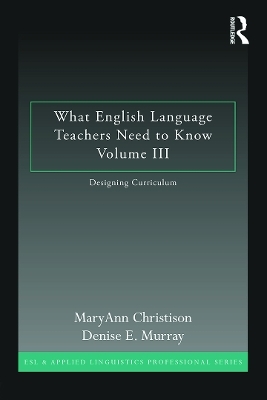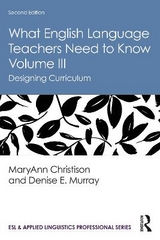
What English Language Teachers Need to Know Volume III
Routledge (Verlag)
978-0-415-66255-0 (ISBN)
- Titel erscheint in neuer Auflage
- Artikel merken
What English Teachers Need to Know, a set of companion texts designed for pre-service teachers and teachers new to the field of ELT, addresses the key question: What do English language teachers need to know and be able to do in order for their students to learn English? These texts work for teachers across different contexts (countries where English is the dominant language, one of the official languages, or taught as a foreign language); different levels (elementary/primary, secondary, college or university, or adult education); and different learning purposes (general English, workplace English, English for academic purposes, or English for specific purposes).
Volume I, on understanding learning, provides the background information that teachers need to know and be able to use in their classroom. Volume II, on facilitating learning, covers the three main facets of teaching: planning, instructing, and assessing. Volume III, on designing curriculum, covers the contexts for, processes in, and types of ELT curricula—linguistic based, content-based, learner-centered, and learning-centered. Throughout the three volumes, the focus is on outcomes, that is, student learning.
Features
• Situated in current research in the field of English language teaching and other disciplines that inform it
• Sample data, including classroom vignettes
• Three kinds of activities/tasks: Reflect, Explore, and Expand
MaryAnn Christison is Professor, University of Utah, Department of Linguistics and the Urban Institute for Teacher Education, USA. Denise E. Murray is Professor Emerita, Macquarie University, Australia and Professor Emerita, San José State University, USA.
Brief ContentsPreface
Acknowledgements
Part I: Contexts for ELT Curricula
1 The Nature of Curriculum Design
2 Social, Political, and Historical Contexts
3 The World of ELT
4 Technological Context
Part II: Key Processes in Curriculum Design
5 The Cycle of Curriculum Design
6 Using Curriculum to Connect Lessons, Courses, and Programs
7 Quality Assurance and Curriculum
Part III: Linguistic-based Curricula
8 The Structural Approach
9 The Notional-Functional Approach
10 The Academic Language Functions Approach
11 A Genre and Text-based Approach
12 A Vocabulary Approach
13 A Skills-based Approach
Part IV: Content-based Curricula
14 The Integration of Content and Language
15 Topical and Situational Approaches
Part V: Learner Centered Curricula
16 A Negotiated Curriculum
17 A Humanistic Curriculum
18 A Task-based Curriculum
Part VI: Learning Centered Curricula
19 Outcome-based Education
20 Competency-based Curriculum
21 Standards-based Curriculum
| Reihe/Serie | ESL & Applied Linguistics Professional Series |
|---|---|
| Verlagsort | London |
| Sprache | englisch |
| Maße | 152 x 229 mm |
| Gewicht | 422 g |
| Themenwelt | Schulbuch / Wörterbuch ► Wörterbuch / Fremdsprachen |
| Geisteswissenschaften ► Sprach- / Literaturwissenschaft ► Sprachwissenschaft | |
| Sozialwissenschaften ► Pädagogik | |
| ISBN-10 | 0-415-66255-9 / 0415662559 |
| ISBN-13 | 978-0-415-66255-0 / 9780415662550 |
| Zustand | Neuware |
| Informationen gemäß Produktsicherheitsverordnung (GPSR) | |
| Haben Sie eine Frage zum Produkt? |
aus dem Bereich



